TIMES





IN THIS ISSUE P12: WHERE FUTURES BEGIN IS JUST THE BEGINNING
P20: FOR THE LOVE OF THEATER
P24: INSPIRING SMALL BUSINESS OWNERS

So
We
TO OUR ALUMNI AND FRIENDS:
During my first 100 days in office, I — along with many members of the Tri-C community — held listening sessions with students, faculty, staff and community members to help define the future of our institution.
Three themes emerged in those sessions: We wanted to build a culture of clarity, redesign the student experience and strengthen the College’s value proposition. We then began developing strategic plans and initiatives around those themes.
As we move toward the start of the 2024-2025 academic year, we are seeing those efforts bear fruit.
In this issue of Tri-C Times, you’ll learn how we used that feedback to simplify processes to help students navigate college.
AND NONCREDIT PROGRAMS

FIVE ACADEMIC
CREATING COMMUNITIES OF SUPPORT FOR STUDENTS AND STREAMLINING THE PATH TO A DEGREE OR CREDENTIAL.
These and other benefits will help future generations of students succeed — as other advancements over the years have helped those who graduated from the College this spring. You can read some of their inspiring stories in our annual graduate feature.
Also in this issue, meet Cheryl Perez, who is motivating small business owners as an instructor for the Center for Entrepreneurs at Corporate College® East, and Tri-C alumna Stephanie Bahnij, who works behind the scenes to bring theater productions to life.
You will read about the late Joanne Lewis, who founded Tri-C’s Robert L. Lewis Academy of Scholars, offering an alternative experience for students interested in social justice and community service.
You will learn about our Vendor Inclusion Strategy, which helps broaden opportunities for minority-owned and women-owned businesses.
And you will read about Tri-C’s first bachelor’s degree program, coming this fall — a tremendous milestone for the College.
I am truly excited about our future, and after reading this issue of Tri-C Times, I hope you will share our pride in being our community’s College.
Sincerely,
Michael A. Baston, J.D., Ed.D. President, Cuyahoga Community College

EDITOR
Anthony Moujaes
MANAGING EDITOR
Jarrod Zickefoose
ASSISTANT EDITOR
Erik Cassano
COPY EDITOR
Noelle Bye
WRITERS
Noelle Bye
Erik Cassano
Anthony Moujaes
Dylanne Weese
Jarrod Zickefoose
ART DIRECTOR
Eric Wheeler
PHOTOGRAPHERS
Noelle Bye
Tamara London
Janet Macoska
McKinley Wiley
Cody York
ILLUSTRATOR
Eric Wheeler



Morelle McCane is taking on all challengers in pursuit of Olympic glory. A 2017 Tri-C graduate, McCane is the first female boxer from Cleveland to compete in the Olympics. She won a silver medal in the 66-kilogram (146-pound) weight class at the Pan American Games in Chile in 2023 to clinch an Olympic berth. The women’s boxing competition runs from July 27 – Aug. 10.


Tens of thousands of people gathered in downtown Cleveland for the 45th Tri-C JazzFest Cleveland, presented by KeyBank. The June festival celebrated the history and future of jazz by showcasing Grammy winners and music legends paired with up-and-coming artists.
Tri-C alumnus Dr. Carl Allamby, a physician with the Cleveland Clinic Hillcrest Hospital, received the American Association of Community Colleges (AACC) Outstanding Alumni Award in the spring. Before his career in medicine, Allamby owned and operated an auto mechanic business for 25 years. He first came to Tri-C at age 19 for auto tech courses and returned to complete an Associate of Arts on his way to a medical degree.
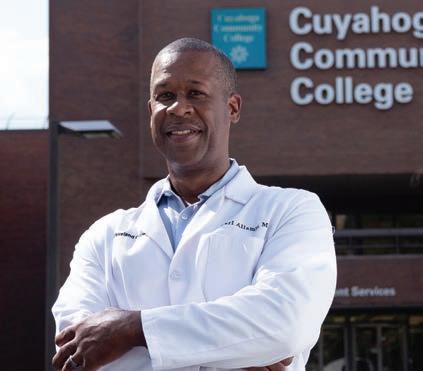


Weese
PHOTOS BY
Cody York, Janet Macoska and Tamara London

Each academic year at Cuyahoga Community College (Tri-C®) culminates in a celebration of growth and achievement with the College’s Commencement exercises. Graduates reflect on their hard work and journeys, supported by faculty and peers, as they prepare to embark on promising futures enriched by knowledge and experience gained.
Commencement marks the end of a significant chapter and the beginning of new opportunities and challenges. With diplomas in hand and cherished memories, graduates step forward, poised to make meaningful contributions to their communities and beyond, embodying Tri-C’s commitment to lifelong learning.
Nearly 1,700 graduates received their degrees and certificates from the College this spring. What follows is a collection of stories that embody the determination and ambition of the Class of 2024.

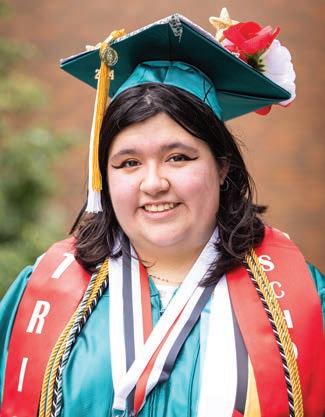
AFTER SPENDING YEARS NAVIGATING HER MENTAL HEALTH

A PASSION FOR HELPING OTHER PEOPLE OVERCOME THEIR OWN MENTAL HEALTH CHALLENGES. THE SOCIAL WORKERS WITH WHOM LUCAS WORKED INSPIRED HER TO BE A PILLAR OF STRENGTH FOR OTHERS.
Lucas enrolled in Tri-C after leaving Cleveland State University. Her social workers encouraged her to tour Tri-C, and she fell in love with the support and community. She enrolled in Fall 2022, making her the first person in her family to attend college.
Lucas graduated with an Associate of Arts during the College’s Spring Commencement in May. She is transferring back to CSU to pursue a bachelor’s degree in social work.
Tell us about yourself.
I am incredibly passionate about social work, sociology, psychology and philosophy. The struggles I had in my childhood regarding my mental health (depression, anxiety, PTSD and ADHD) led me to pursue social work. Despite the barriers I faced, my social workers and therapists changed my world for the better. I was encouraged to start my journey at Tri-C by one of my social workers, and it was the best decision I made.
did
I came to Tri-C feeling anxious, fearful and less confident in my abilities. I lacked the passion to operate at my full potential. Tri-C turned me into a person completely in love with academia and learning. Tri-C made me realize that even if I had fallen before, it simply meant I needed to get up and dust myself off before trying again.
Did you participate in student life at Tri-C?
I loved to participate in student life at Tri-C. I accompanied the Psychology Club to the Akron Psychology Museum, attended countless Jack, Joseph and Morton Mandel Scholars Academy events, attended Hamilton at Playhouse Square, and signed my name to many student life events. The weekly campus newsletter practically shaped my schedule. I was also the secretary of the Lambda Gender-Sexuality Alliance at the Westshore Campus.
Do you have any pearls of wisdom to share with students considering a similar degree or certificate program?
Carefully consider your limits. I am an overachiever, but we are not robots. There is support in every corner. Your professors want you to succeed and often will work with you.
“TRI-C MADE ME REALIZE THAT EVEN IF I HAD FALLEN BEFORE, IT SIMPLY MEANT I NEEDED TO GET UP AND DUST MYSELF OFF BEFORE TRYING AGAIN.”
— Jasmin Lucas
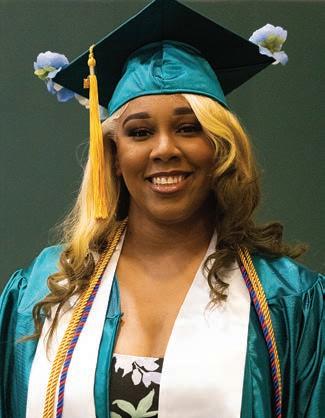

SOME STUDENTS GO TO TRI-C BEFORE ATTENDING A FOUR-YEAR COLLEGE. MONAIE FARMER CAME TO THE COLLEGE TO CONTINUE HER EDUCATION.
Farmer, who always knew she wanted to work with animals, enrolled in the College’s Veterinary Technology program in 2022 after graduating from Kent State University with a bachelor’s degree in zoology.
Farmer graduated with an Associate of Applied Science in May and will continue working at the Metropolitan Veterinary Hospital, where she has been for five years.
Tell us about yourself.
I am the only person in my family in this field. It was hard, but no one ever doubted my judgment. I am African American. In 2021, 82.1% of the veterinary technologists and technicians in the workforce were white (data from Veterinary Technologists and Technicians | Data USA). My ethnicity is very small in the field, which has discouraged me a little. But everyone I have met has encouraged and helped me so much. I found that I love working in emergency care. I love how fast-paced it is.
“NO MATTER WHAT YOU WANT TO DO IN LIFE, NEVER LET ANYONE TELL YOU THAT YOU CAN’T DO IT.”
— Monaie Farmer
I wanted to apply to veterinary school after I finished my bachelor's, but halfway through, I changed my goal. I learned about becoming a registered veterinarian technician through my job and found Tri-C, which is very close to home.
Describe your Tri-C experience. Did a specific person, class or event play a role in your success?
My professors were key to my success. Without the help of Associate Professor Terence Kline and Adjunct Heather Izanec, I would not have been able to grow in this field.
Did you participate in student life at Tri-C?
I was part of the Vet Tech Club, where we raised donations for shelters and worked with every animal that comes through Tri-C so that when it’s their time to be adopted, they are socialized enough to go to new loving homes.
Do you have any pearls of wisdom to share with students considering a similar degree or certificate program?
No matter what you want to do in life, never let anyone tell you that you can’t do it. I had doubts about going into this field when I decided not to become a veterinarian. But by becoming a vet tech, I was able to accomplish my dream differently.


WITH NOT ONE BUT TWO ACHIEVEMENTS: HIS HIGH SCHOOL DIPLOMA FROM EUCLID HIGH SCHOOL AND AN ASSOCIATE OF APPLIED SCIENCE FROM TRI-C IN MAY.
The 18-year-old, who is passionate about technology, wanted to challenge himself, so he enrolled in Tri-C’s College Credit Plus (CCP) program when he was 14.
He will transfer to Cleveland State University as a Jack, Joseph and Morton Mandel Honors College Scholar.
Tell us about yourself.
I am deeply passionate about technology and its potential to solve real-world problems. I am also known for my positive personality in the classroom and my ability to put a smile on anyone's face.
My educational journey was shaped by a blend of curiosity, resilience and a drive for continuous learning. My professors noticed my engineering skills and my exceptional learning ability. The recognition from my professors fueled my passion for electrical engineering and instilled a sense of confidence in my abilities.
Upon entering high school, I decided to take advantage of the College Credit Plus (CCP) program at Tri-C. I excelled in Euclid High School’s gifted program and consistently ranked at the top of my classes. The CCP program presented an opportunity to further challenge myself.
Describe your Tri-C experience. Did a specific person, class or event play a role in your success?
My experience at Tri-C was both challenging and rewarding, shaping my academic journey in profound ways. Grappling with complex material at a young age presented its hurdles, but through perseverance and dedication, I gradually mastered the concepts. The support and guidance from professors and classmates played a pivotal role in my success.
How did Tri-C change your life?
Tri-C provided me with a solid foundation in electrical engineering education and prepared me for future academic and professional endeavors. Additionally, Tri-C opened doors to opportunities for personal and professional growth, which allowed me to explore my interests, build meaningful connections, and lay the groundwork for a successful career in engineering.
Do you have any pearls of wisdom to share with students considering a similar degree or certificate program?
Embrace curiosity and cultivate strong relationships with classmates and professors. Remember, you are not alone in your journey, and collaboration with peers and mentors can greatly enhance your learning experience. Don't be intimidated by the rigorous workload. Above all, maintain perseverance and resilience, and never hesitate to seek support when faced with challenges.


AFTER GRADUATING FROM HIGH SCHOOL IN 2020, DESTINY GRIFFITHS KNEW SHE WANTED TO ATTEND TRI-C, BUT SHE WASN’T SURE WHAT FIELD TO PURSUE.
Griffiths enjoyed being outside, and after looking into careers where she could be outdoors, she discovered arboriculture. Arboriculture focuses on the cultivation, management and study of trees and other woody plants. Without any prior knowledge of the field, Griffiths enrolled in the Plant Science and Landscape Technology program at Tri-C.
What she found within the program was a new passion for preserving trees and a drive to continuously learn.
“I am passionate about arboriculture. I want to preserve trees. I love being outside while I am working and during my free time,” she said.
Griffiths graduated with an Associate of Applied Science in May. While she pursues an International Society of Arboriculture Arborist Certification, she will work at the Davey Tree Expert Company, climbing and pruning trees to promote healthy growth.
“GET OUT OF YOUR COMFORT ZONE, TRY NEW THINGS, MEET NEW PEOPLE, AND APPLY FOR THAT INTERNSHIP, JOB OR OTHER OPPORTUNITY.”
— Destiny Griffiths
Describe your Tri-C experience. Did a specific person, class or event play a role in your success?
The National Collegiate Landscape Competition, held by the National Association of Landscape Professionals, changed my life. I grew immensely as a green industry professional. The event has fueled my interest in the industry, allowed me to hone new skills and prepared me to succeed in my future endeavors.
How did Tri-C change your life?
Through the plant science program at Tri-C, I gained lifelong friends, skills in various parts of the green industry, a passion for saving trees and a never-ending thirst for opportunities to apply my skills and gain more knowledge. I would never have known what I was capable of if I had never left my comfort zone.
Did you participate in student life at Tri-C?
I attended various plant science club outings and meetings. Because of my involvement, I was able to tour impressive gardens and get to know my peers better.
Do you have any pearls of wisdom to share with students considering a similar degree or certificate program?
Get out of your comfort zone, try new things, meet new people, and apply for that internship, job or other opportunity. The worst that could happen is that you hear a “no.” But you’ll never get anything if you don’t try.


AYODELE ONOYUNGBO LEFT HER HOME IN NIGERIA IN 2019 TO IMMIGRATE TO THE UNITED STATES AND EMBARK ON A NEW JOURNEY. HER FRESH START IN OHIO INCLUDED ENROLLING AT TRI-C IN 2022.
Today, Onoyungbo says she feels fearless and capable of taking on any challenge.
“Tri-C taught me humility and the value of starting small,” she said. “Because of Tri-C, I am a more patient person. I have gained the courage to carve my path and make my own decisions, even if others don’t necessarily understand or agree.”
Onoyungbo says the most important thing she learned is to be flexible and adaptable like water, which she explained by quoting from Memoirs of a Geisha: “Water can carve its way through stone. And when trapped, water makes a new path.”
Onoyungbo graduated from Tri-C with an Associate of Arts in May. Next, she plans to transfer to a four-year school and major in international relations and economics before going to law school.
“TRI-C TAUGHT ME HUMILITY AND THE VALUE OF STARTING SMALL.”
— Ayodele Onoyungbo
Tell us about yourself.
I am passionate about being of service to people. Building human connections and taking little steps every day that make a positive impact on the world fulfills me. I want to become an ambassador and make connections with people from backgrounds across the globe. I had a chart that mapped out my entire life, but moving to America was never part of the plan. It taught me to be open to life.
Describe your Tri-C experience. Did a specific person, class or event play a role in your success?
Tri-C felt like a second home. The faculty and staff were the best parts of the institution. They were my mentors and biggest supporters.
Did you participate in student life at Tri-C? If so, please describe your experiences.
I was part of the Democracy Fellows, and I had incredible experiences organizing events and projects to help educate Tri-C students on their voting rights.
Do you have any pearls of wisdom to share with students considering a similar degree or certificate program?
Be patient with yourself. If you don’t get it today, you’ll get it tomorrow. Remember that your educational journey is yours and no one else’s, so you have the right to shape it as you see fit.
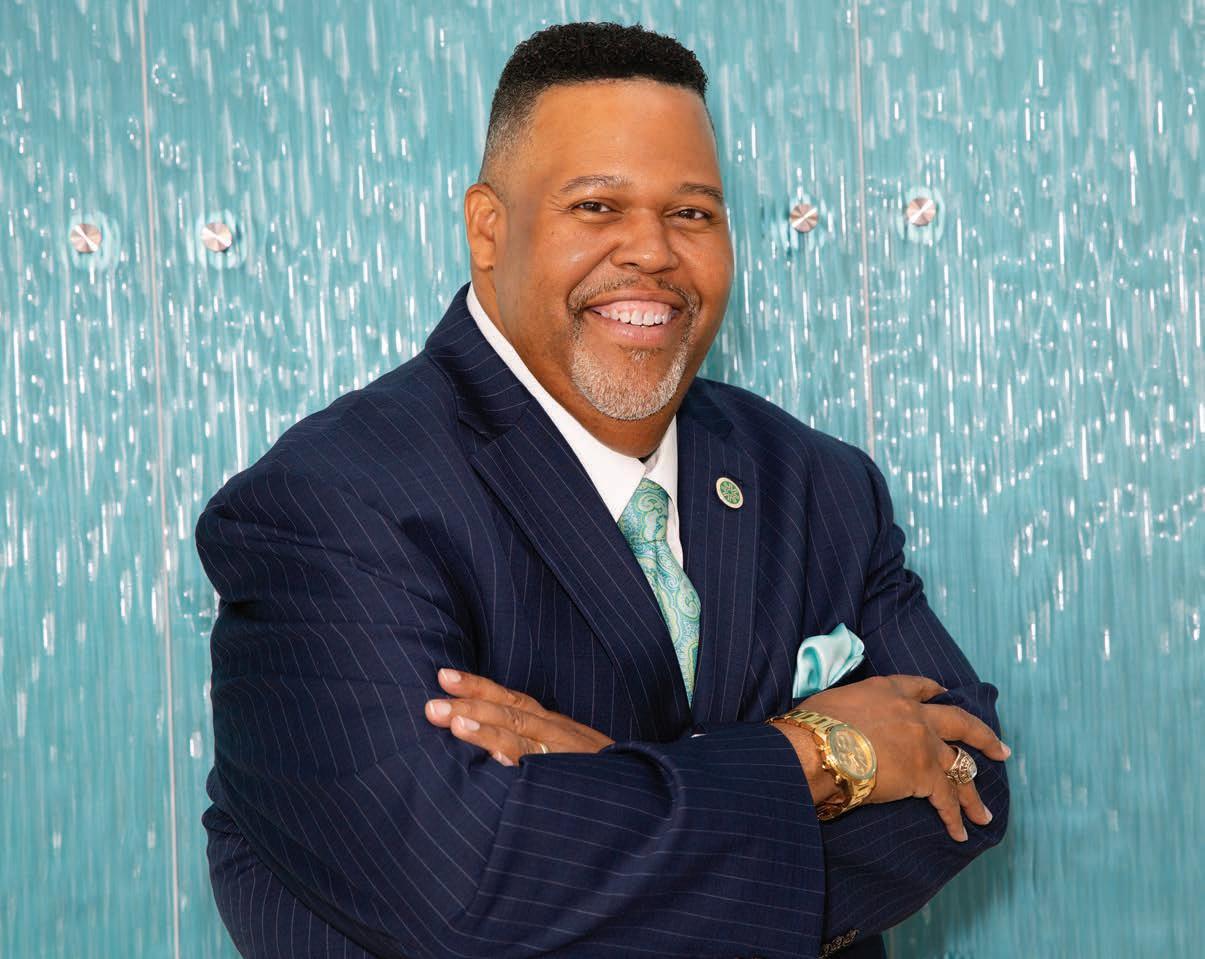
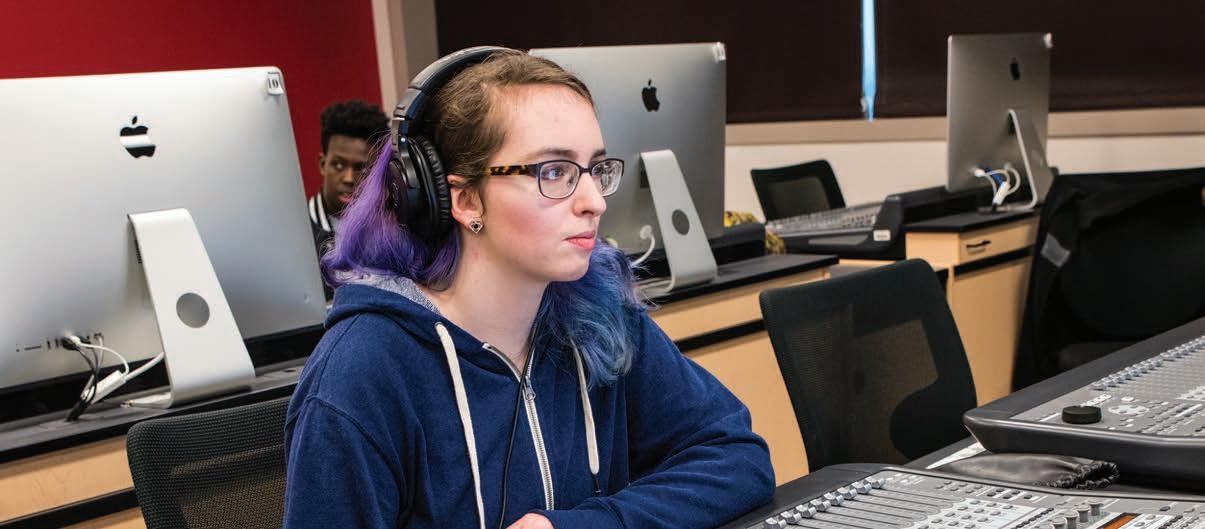
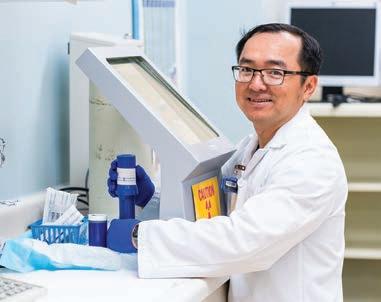

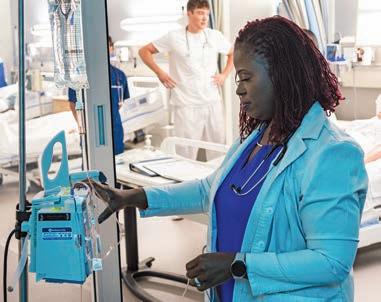

TRI-C
STORY BY Jarrod Zickefoose
BY Noelle Bye and McKinley Wiley
IN THE WORLD OF WORK AND MEET THE NEEDS OF STUDENTS THROUGH A NEW EDUCATIONAL APPROACH
Cuyahoga Community College (Tri-C®) President Michael A. Baston, J.D., Ed.D., is implementing a bold vision to recast the traditional higher education experience, making it easier for students to navigate and control their destiny. It includes making improvements to basic student processes — like enrolling and paying for courses — and extends to the overarching academic structure of Tri-C.
“We are evolving and adapting so that our students can be more successful in a rapidly changing landscape. That involves breaking from the traditional higher education model and becoming better at forecasting the future so we can help shape and build that future,” Baston said.
The contours of this evolution stem from Baston’s early days in office at Tri-C, spent listening to the concerns and hopes of
students, staff, faculty and representatives of the Northeast Ohio business and civic communities. From this “100 days of listening,” he distilled three themes that shaped the goals of the College’s strategic plan: build a culture of clarity, improve the student experience, and strengthen the College’s value proposition.
“This is the community’s plan,” Baston said. “It came from the ground up, not the top down.”
“THIS IS THE COMMUNITY’S PLAN. IT CAME FROM THE GROUND UP, NOT THE TOP DOWN.”
— Michael Baston
Cuyahoga Community College

Cuyahoga Community College
Cuyahoga Community College
School of Creative Arts
Cuyahoga Community College
School of Creative Arts
Cuyahoga Community College
School of Creative Arts
Cuyahoga Community College
School of Liberal Arts and Sciences
Cuyahoga Community College
School of Liberal Arts and Sciences
Cuyahoga Community College
School of Liberal Arts and Sciences
Cuyahoga Community College
School of Nursing and Health Professions
Cuyahoga Community College
School of Nursing and Health Professions
Cuyahoga Community College
School of Nursing and Health Professions
With these three themes as guideposts, Baston and his leadership team researched, traveled to higher education institutions around the country and met with workforce leaders to develop a plan that would place the College at the center of educational and work life in Northeast Ohio — making Tri-C what Baston describes as a “next level” college.
The implementation of the “community’s plan” will result in a closer alignment of credit and noncredit programs, providing the stepping stones to degrees and career development while ensuring those degrees and credentials meet the needs of local employers.
“‘Where futures begin’ is just the beginning,” Baston said. “It’s one amazing way we serve our students, but for others, Tri-C is where futures are recast and transformed.
“We are not changing for the sake of change. We are changing because change is necessary.
“It’s an evolution, the next logical step for an institution that has a long and proud history of growing and adapting. That is what Tri-C has been for 60 years. We are constantly evolving to meet the needs of students and prepare them for the future of work.”
Beginning in the fall semester of 2024, Tri-C will group its programs into five academic schools:
• School of Liberal Arts and Sciences
• School of Creative Ar ts
• School of Advanced Manufacturing , Engineering and Computer Science
• School of Nursing and Health Professions
• School of Business, Legal Professions and Hospitality
School of Business, Legal Professions and Hospitality
School of Business, Legal Professions and Hospitality
Cuyahoga Community College
School of Business, Legal Professions and Hospitality
Cuyahoga Community College
Cuyahoga Community College
School of Advanced Manufacturing, Engineering and Computer Science
School of Advanced Manufacturing, Engineering and Computer Science
Cuyahoga Community College
School of Advanced Manufacturing, Engineering and Computer Science
The schools will house related credit and noncredit programs, providing clear lines to degree and career attainment.
Students will be assigned to a school when they declare a major. Being part of a school will give students a sense of identity and community within the College, while also providing a home base for all of their academic needs.
Students will also receive more personalized attention, career guidance and academic support to help them stay on track and earn credentials and degrees more quickly. Streamlined processes will help them register for the classes they need and connect them with resources across the College.
The academic schools will bring the “feel” of a four-year school to Tri-C while immersing students in their own and adjacent academic fields, helping them clarify and refine their ambitions while building relationships and professional connections that will last a lifetime.
Enhancements to the student experience include improvements to the enrollment and payment processes, flexible course schedules and class options (in-person, online and hybrid), and more robust support teams for students.
Improvements initiated so far include:
One application for credit and noncredit students
The noncredit application has been integrated with the credit application to help students move between credit and noncredit courses and programs.
Use of personal email addresses
Previously, the College only used Tri-C email addresses to communicate with prospective students after their admission. Using personal email addresses will help centralize messages for students, adding convenience and reducing the potential for missed messages.
Awarding scholarships to credit students without requiring an application and a simplified scholarship application for noncredit students
Originally launched in Spring 2023, the no-application scholarship process looks at student data to determine scholarship eligibility. More than 800 students were awarded scholarships that semester without ever applying for them.
A simple online scholarship application was created for noncredit students.
Some scholarships still require additional information, applications or essays, but those that can be automatically awarded now are.
Additional scheduling opportunities for late registrants
Students who begin admission and onboarding close to the start of the semester (and after 16- and 14-week classes have begun) now have a 12-week option instead of waiting for the following term.
Increased visibility of Online Readiness Experience
The College enhanced its email, postcard and texting campaigns to bring more visibility to its My Online Readiness Experience, an educational initiative to improve student success in online courses.
Simplified course option definitions
After conducting student surveys and focus groups, new course option definitions were added to the course schedule to help students make selections based on learning style preferences.
The College is also exploring improvements to its chatbot and AI platforms, its customer-relationship management software and its registration process.
This student-centered vision for Tri-C is expressed through the changes the College is implementing, but the value of these changes will be measured by the success of the students who come to the institution.
By offering flexible schedules, easier enrollment and payment processes, constant student support, and program, degree and certificate options that respond to and shape the workforce, Baston envisions Tri-C as a lifelong learning partner.
“We don’t see ourselves as a pass-through institution,” Baston said, describing Tri-C as a hub for education and credentialing to be visited and revisited at any point during a person’s career.
In addition to its many associate degrees and credentials, Tri-C will offer its first bachelor’s degree in Fall 2024: a Bachelor of Applied Science in Integrated Digital Manufacturing Engineering Technology.
As the world of work evolves, Tri-C will remain the gold standard in Northeast Ohio for upskilling, degree and certification attainment by working with business and industry to better forecast and understand the future of work.
The College recently completed a report on the “gig economy” in an effort to better understand this skilled and growing segment of Northeast Ohio’s workforce.
Flexibility — in life and training — emerged as key driver for this group. Tri-C’s flexible scheduling (including the recent addition of 12-week courses) and online, in-person and hybrid offerings are ready-made to help meet gig workers — and others — where they are.
“The world of work has evolved, and we are evolving in response to that,” Baston said. “We are breaking from the more traditional, and somewhat rigid, higher education experience by giving students greater control. We're helping them curate and design their destiny by providing more flexible educational choices and options that fit with their lives.”
The changes implemented at Tri-C — and changes to come — are in the service of creating a new kind of experience for students, meeting them on their terms, and preparing them for academic and professional success.
“Instead of our students asking, ‘Am I ready for the world?’” Baston said, “we want them to ask, ‘Is the world ready for me?’”
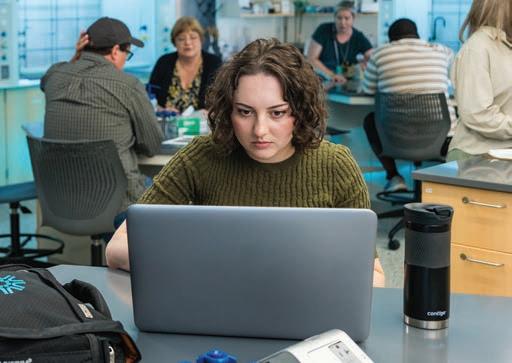


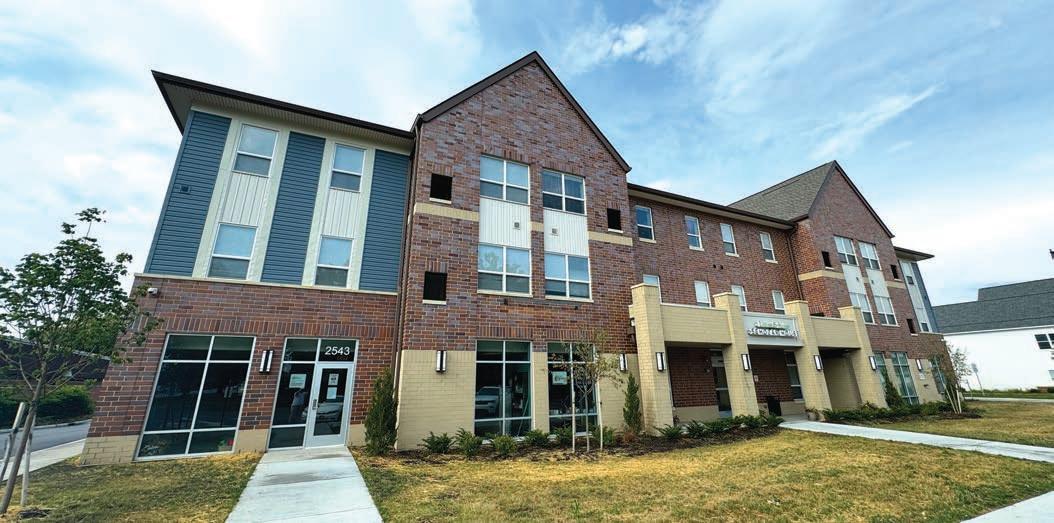
Across the street from the Cuyahoga Community College (Tri-C®) Metropolitan Campus, a three-story residential building stands as a symbol of hope and opportunity for single parents balancing parenthood with their pursuit of earning a college degree.
The Louise C. Stokes Scholar House opened in April after eight years of planning and construction. Envisioned as a space to break the poverty cycle and support academic success, the Scholar House welcomed its first residents in the spring. Every unit is occupied.
The 40 two- and three-bedroom units have a kitchen and high-speed internet. Other amenities include on-site day care, a computer lab, study lounges, an exercise room, a children’s playroom and a laundry room.
But the Scholar House goes beyond the roof over a student’s head. Students have wraparound support to navigate the complexities of college life, from selecting courses to accessing tutoring services. They are encouraged to participate in skill-building workshops and career development programs that equip them with the tools to thrive in the professional world.
But one of the most significant aspects of the Scholar House is the sense of community it fosters, surrounding the students with peers who share similar experiences.
Tri-C student and U.S. Army veteran Alyssa Holland lives in one of the units with her two children while she pursues a recording arts degree.
“This is something that I didn’t expect to have,” Holland said. “There’s no real way to fail here. They’ve set it up so you can just knock over the dominoes and go about your day.”
The building is within walking distance of Tri-C and Cleveland State University. Other partners include CHN Housing Partners, the United Way of Greater Cleveland, the Cleveland Metropolitan Housing Authority and Step Forward.
Through shared activities, communal spaces and group events, residents form bonds that extend beyond the confines of their housing complex, providing emotional support and encouragement during both triumphs and challenges.
“The Louise C. Stokes Scholar House has been wonderful for me and my son,” said Tri-C student and resident Marilyn Santiago. “Living somewhere where all the parents are full-time students creates such a strong community because we all understand and can support each other through raising a child while being in school.”
“LIVING SOMEWHERE WHERE ALL THE PARENTS ARE FULL-TIME STUDENTS CREATES SUCH A STRONG COMMUNITY BECAUSE WE ALL UNDERSTAND AND CAN SUPPORT EACH OTHER THROUGH RAISING A CHILD WHILE BEING IN SCHOOL.”
— Marilyn Santiago

Cuyahoga Community College (Tri-C®) wants to support the community that supports the College by continuing to broaden access for small and diverse businesses. Tri-C’s goal is to create opportunities for small businesses to grow and help drive economic growth in Northeast Ohio.
Tri-C created an Economic Inclusion Plan — which includes a Vendor Inclusion Strategy — to ensure that local, small firms have an equitable opportunity to work on Tri-C's many projects. The Vendor Inclusion Strategy aims to help various types of small businesses, such as minorityowned, disadvantaged, veteran-owned and women-owned businesses.
“Access to opportunities is what we stand for,” said Cindy Leitson, the vice president of Capital, Construction and Facilities at Tri-C. “Our Vendor Inclusion Strategy is about creating fair chances for all businesses to grow alongside us.”
Between 2018 and 2021, the College managed a $227 million bond allocated for infrastructure improvements — of which $185 million was designated for construction. Approximately $93 million of the $185 million was awarded to small and diverse businesses, Leitson said.
The College has hosted networking events and information sessions to keep small- and medium-sized businesses apprised of projects and opportunities for collaboration.
“Our goal is to continue doing strong projects that we design with community feedback and source our suppliers with strong local architects, construction firms and contractors,” Leitson said.
As part of this effort, the College has divided some larger projects into smaller components, allowing small, minority-owned and veteran-owned businesses to compete more effectively for bids.
“We want to break it down as much as possible to make sure we’re casting a wide net,” Leitson said.
Next Generation Construction is an example of a firm that benefited from this process.
When Next Generation started working with Tri-C, it was a subcontractor under the Gilbane Building Company and had 15 to 20 employees.
Next Generation worked on a restroom project from 2019 through 2021 as part of the Infrastructure Maintenance project, funded by the $227 million bond. Leitson said there were around 45 to 55 projects within the one larger project, including roofing, floor and restroom upgrades. Next Generation completed the carpentry and plumbing for Gilbane.
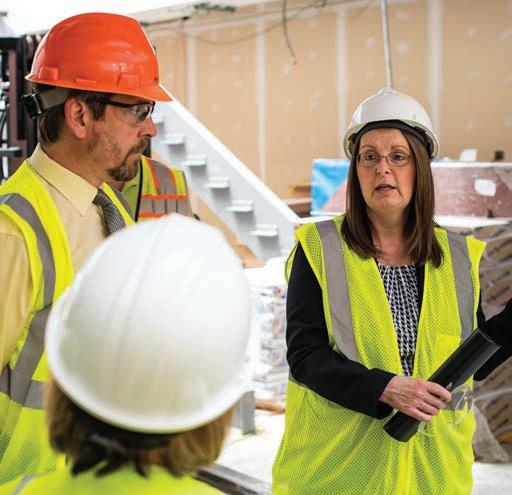

Tri-C also integrates students into projects, allowing them to gain practical experience.
“We encourage all our construction firms to bring on interns, and when possible, they hired many through our construction technology and engineering programs at Tri-C,” Leitson said.
As Tri-C continues to build on foundational principles, the focus remains on promoting access, equity and success. Each initiative and project under the Economic Inclusion Plan not only advances the College’s strategic goals but also reinforces its commitment to the economic vitality of the communities it serves.
“We want to make sure that we help see the growth of small businesses,” Leitson said.
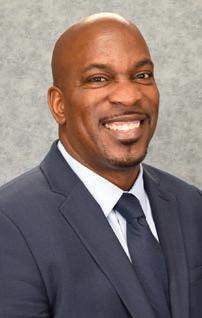

Next Generation is now leading a $2.9 million renovation project for 36 restrooms across three campuses as the Construction Manager at Risk (CMAR) firm. The project began in March and is set to continue through December. Next Generation was also recently recognized as the Small Business of the Year for Northern Ohio by the U.S. Small Business Administration and has grown to more than 75 employees.
“OUR VENDOR INCLUSION STRATEGY IS ABOUT CREATING FAIR CHANCES FOR ALL BUSINESSES TO GROW ALONGSIDE US.”
— Cindy Leitson


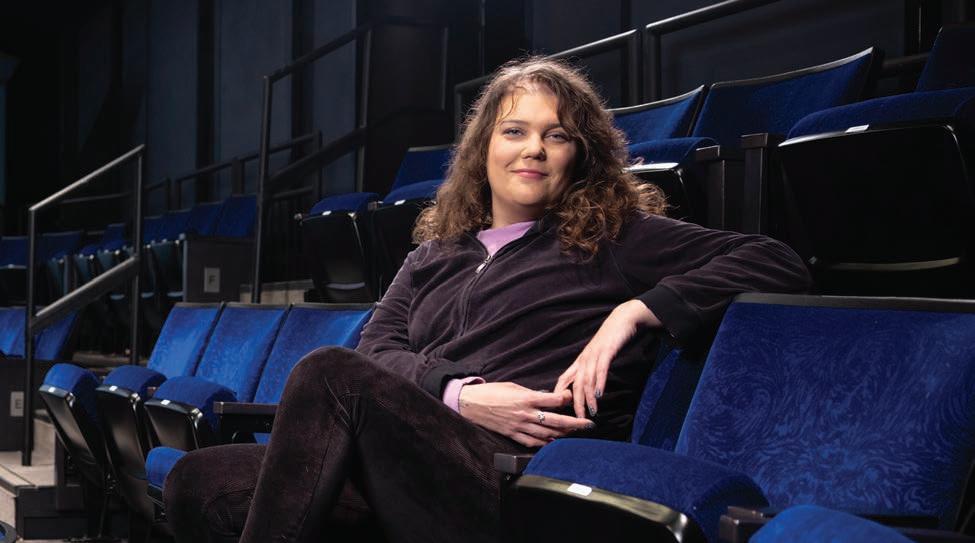
WHEN THE CURTAIN GOES UP AND THE ACTORS TAKE THE STAGE, A CREW OF DOZENS REMAINS UNSEEN, HELPING EVERY THEATER PRODUCTION RUN SMOOTHLY. TRI-C GRADUATE STEPHANIE BAHNIJ IS AMONG THEM.
Live theater happens in one take. Unlike film, where a mistake can usually be fixed with a subsequent take or an imperfection erased in post-production, a stage show is a performance without pause.
The actors must memorize their lines and remember their blocking, but that’s only part of the delicate dance that takes place for several hours each night. Behind the faces in the spotlight is a technical theater crew, managing costume and scene changes, lights, sounds, special effects and numerous other things that allow the audience to stay immersed in the experience.









One slip-up could jolt the audience back to reality. Cuyahoga Community College (Tri-C®) graduate and technical theater specialist Stephanie Bahnij realizes that — and she relishes her role in making sure that doesn’t happen.
Bahnij, who earned an Associate of Arts from Tri-C in 2010, has worked in every behind-the-scenes aspect of theater during her career, with organizations including the Cleveland Play House and the Ohio Shakespeare Festival. Whether the job is as big as running the light board or as small as making sure the actors have water to drink between scenes, it all contributes to a flawless show.
“You get used to working in the dark,” Bahnij said. “We have low-level blue lights that allow us to not work in total darkness. But before the show starts, you really have to know where everything is so you can find it in minimal light. Those lights and our audio headset system allow us to operate behind the scenes during a show.”
Bahnij’s career in technical theater stems from a love she developed as a child — a love that grew during her time at Tri-C.
“YOU GET USED TO WORKING IN THE DARK. WE HAVE LOW-LEVEL BLUE LIGHTS THAT ALLOW US TO NOT WORK IN TOTAL DARKNESS. BUT BEFORE THE SHOW STARTS, YOU REALLY HAVE TO KNOW WHERE EVERYTHING IS SO YOU CAN FIND IT IN MINIMAL LIGHT.”
— Stephanie Bahnij

Bahnij was always interested in the world of fiction. As a child, she read books and wrote stories. Her parents took her to plays. But one film opened her eyes to the world taking place behind the scenes.
“I had the collector’s edition DVD of Labyrinth, which is a fantasy film from the ‘80s,” she said. “I remember in one of the behind-the-scenes featurettes, they showed how the crew would blow glitter around the set to make the trees sparkle. It was such an amazing effect to me, and it showed me how you can make things look however you want. I was like, ‘Wow, someone gets paid to make these effects happen.’”
Bahnij followed her newfound passion in high school, becoming involved with theater at Padua Franciscan High School in Parma, where she graduated in 2006.

She enrolled at Kent State University, but shortly thereafter, life got in the way and forced her in a new direction — a direction that brought her to Tri-C.
“Right before I went to Kent, I was diagnosed with thyroid cancer,” she said. “Instead of going to Kent, I enrolled at Tri-C as a way to keep up on my studies while undergoing surgery and treatment.”
But at Tri-C, Bahnij found more than just a place to take classes while recovering. She found a vibrant theater program at the Western Campus. As Bahnij regained her health, she became more involved in the campus productions.
“Tri-C is where I first really started to think about theater as a career and not just a hobby or interest,” she said.
“RIGHT BEFORE I WENT TO KENT (STATE UNIVERSITY), I WAS DIAGNOSED WITH THYROID CANCER. INSTEAD OF GOING TO KENT, I ENROLLED AT TRI-C AS A
WAY TO KEEP UP ON MY STUDIES WHILE UNDERGOING SURGERY AND TREATMENT.”
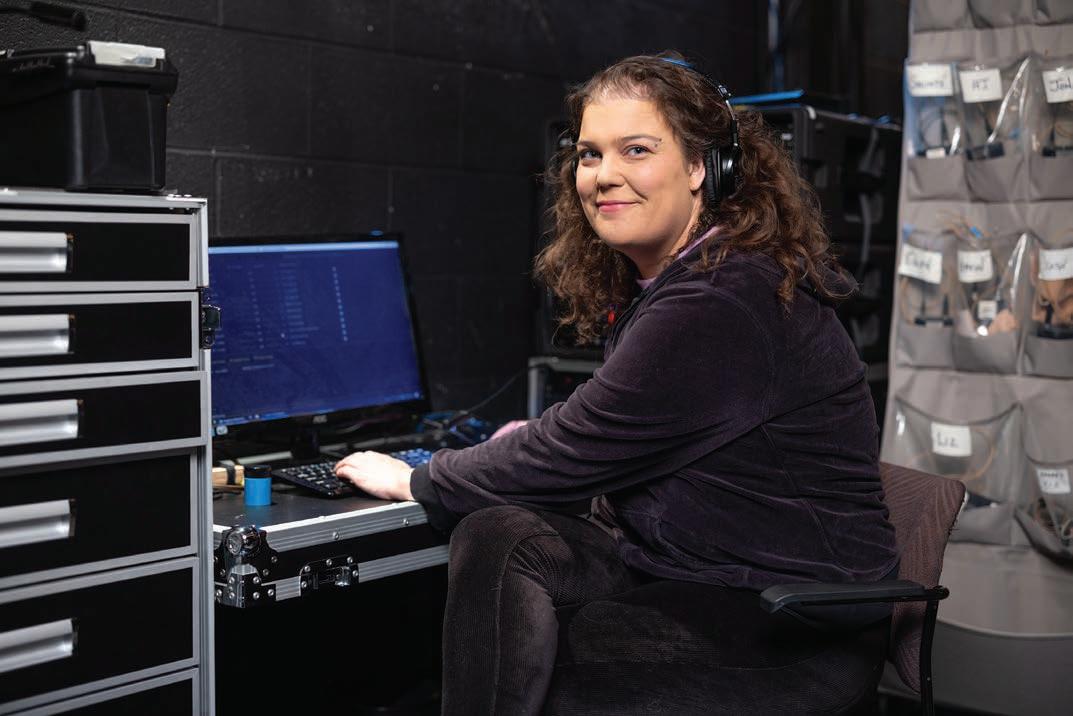
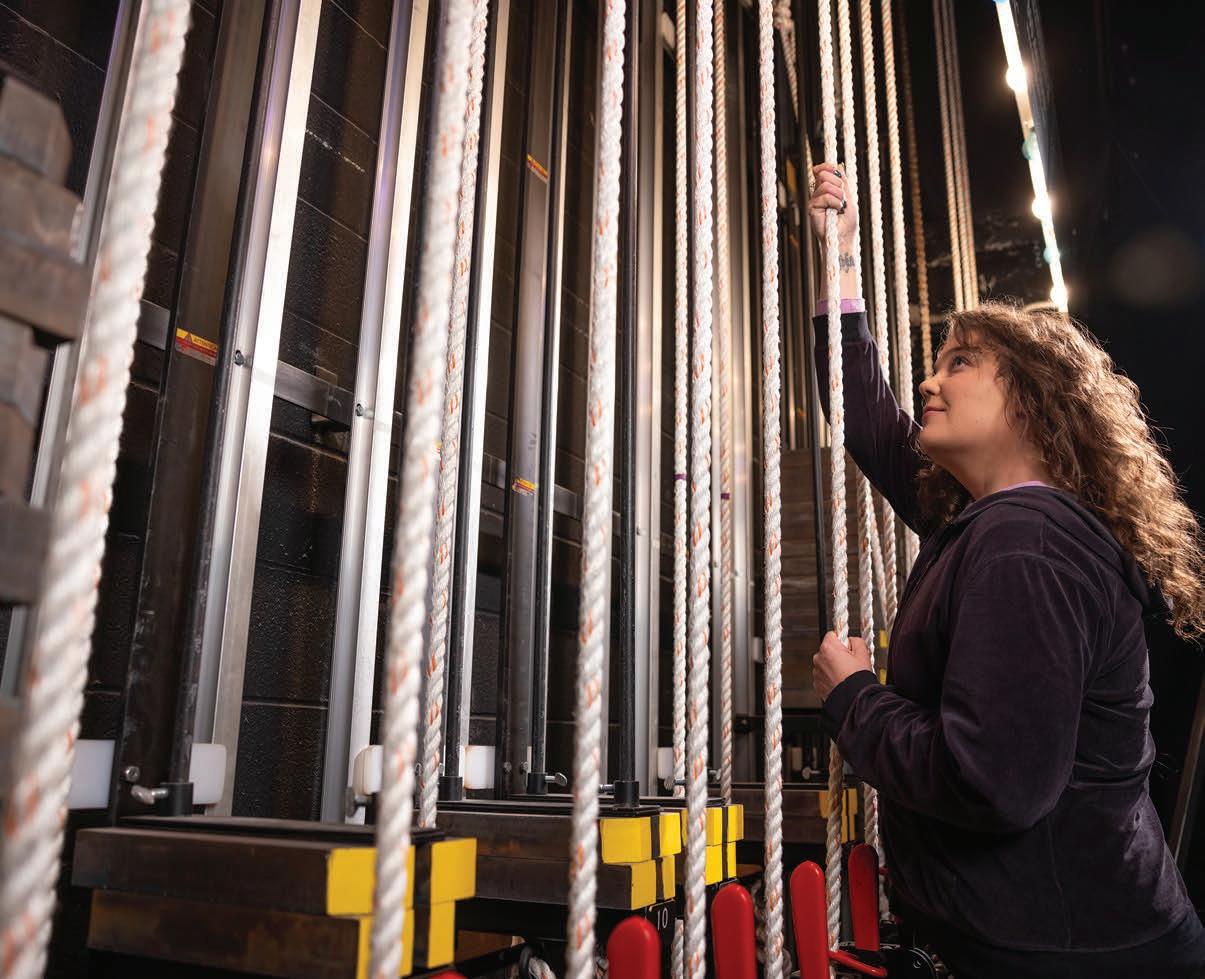
“I first came to Tri-C to be a philosophy major, but I think all the arrows were always pointing me to theater work.”
She began working as a student assistant on set designs, where her artistic eye became known to the theater faculty and staff.
“We were getting ready for a production, and one of the sets had a brick pattern that the set designer couldn’t get to line up correctly,” Bahnij said. “I just made a small adjustment, turning one of the bricks 90 degrees, and everything just fell
into place. The set designer was like, ‘Are you a Tetris master or something? You’ve been bitten by the bug. You’re one of us.’”
She began taking classes in lighting, audio and set design, turning her love of theater and artistic talent into the beginnings of a career. After she graduated from Tri-C, she enrolled at Cleveland State University, earning a bachelor’s degree and developing the connections that led her to the Cleveland Play House, where she continues to work on productions at Playhouse Square’s Allen Theatre.

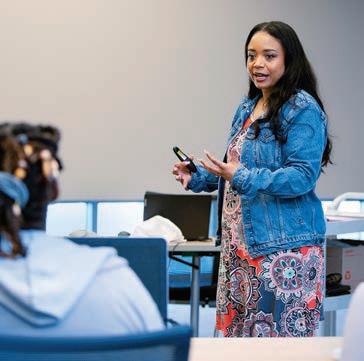
Cheryl Perez revels in motivating new entrepreneurs embarking on their journeys.
And with more than 25 years in business coaching and nonprofit development, Perez was a perfect fit for the new Center for Entrepreneurs at Corporate College® East.
With her real-world experience, Perez is helping budding business owners mold their ideas into a practical business model at the Center, which Cuyahoga Community College (Tri-C®) launched in the fall of 2023.
Ronna McNair, the executive director of the Center, approached Perez about teaching a course after seeing her lead a workshop on small business ownership.
Perez loved the program’s structure, which gives students the tools and services to move their ideas forward, whether they want to be part of the gig economy, start their own business, or expand an existing business.
STORY AND PHOTOS BY Noelle Bye
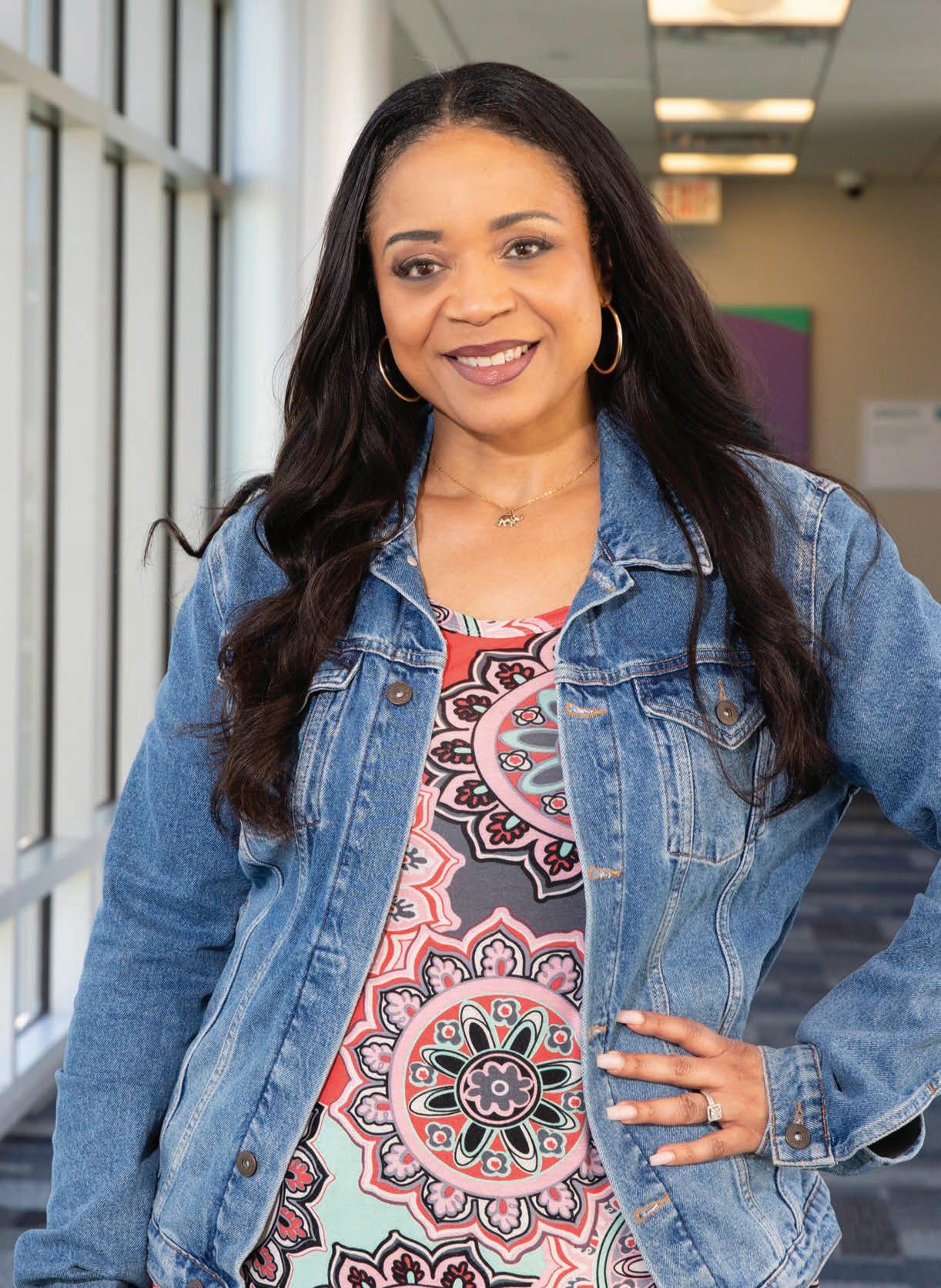

The Center offers four tracks: Discovery, Foundation, Acceleration and Expansion. Perez is teaching the Launch It course, which is part of the Center’s Discovery Track. The Discovery Track’s curriculum helps students identify their passions and turn their ideas into reality. The track’s other courses include Preparing Your Passion for Profit, Creating Your Business Structure and Establishing Your Brand.
“I think that one of the unique features of the Center program is that it is taught by entrepreneurs who not only are teaching the curriculum from an academic perspective but also live the curriculum every single day,” Perez said. “You learn so much throughout an entrepreneurial journey on what to do, what not to do, what works and what doesn’t work, so I think throughout all the lessons, we’re able to apply personal experiences, tips, tools and hacks that aren’t necessarily going to be present in the curriculum itself.”
The Center also offers a workshop series and podcasting courses.
Perez was especially drawn to the Center when she realized the course she would teach was similar in size to the small groups she mentors through her company, Cheryl C. Perez Enterprises. Founded in 2018, the six-member business provides consulting, coaching and development training for small business owners, nonprofits and entrepreneurs.
Perez has helmed a number of six- and seven-figure businesses, but the road of entrepreneurship can be filled with twists, turns and a few bumps. She hit a major obstacle in 2016 when she was diagnosed with cancer while serving as the president and managing partner of the human resources consulting firm BIG-HR. She had to rely on her 13 employees to keep the business afloat while she recovered.
“I THINK THAT ONE OF THE UNIQUE FEATURES OF THE CENTER PROGRAM IS THAT IT IS TAUGHT BY ENTREPRENEURS WHO NOT ONLY ARE TEACHING THE CURRICULUM FROM AN ACADEMIC PERSPECTIVE BUT ALSO LIVE THE CURRICULUM EVERY SINGLE DAY.”
— Cheryl Perez



“PART OF THE REASON I WAS ASKED TO TEACH IN THIS PARTICULAR PROGRAM OF THE CENTER FOR ENTREPRENEURSHIP IS BECAUSE THAT IS AN AREA OF SPECIALIZATION FOR ME, AND THERE ARE TONS OF VIDEOS ON MY YOUTUBE CHANNEL THAT RELATE TO THE COURSEWORK.”
— Cheryl Perez

“It was the first true test to put my money where my mouth was,” she said. “I knew going through that health challenge that I needed to have the team in place, and I needed to have the structure and systems in place to be able to take the time to get better and recover. And I was very, very proud that my team still flourished and the business was still successful.”
Today, Perez fills her spare time with yoga, gardening and, most importantly, her husband and six children.
Perez is also involved with several philanthropic organizations and boards, including her sorority, Delta Sigma Theta Sorority Incorporated, the United Black Fund of Greater Cleveland, the CMHS Minority Alumni Council, the Greater Cleveland Partnership and the National Small Business Association.
Plus, she hosts a weekly YouTube show, CPTV. She started producing videos in 2020 and has about 26,000 subscribers. Her videos teach aspiring and growth-stage entrepreneurs how to create the structures, strategies, systems and processes needed to build their teams and businesses.
“Part of the reason I was asked to teach in this particular program of the Center for Entrepreneurship is because that is an area of specialization for me, and there are tons of videos on my YouTube channel that relate to the coursework,” Perez said.
At the beginning of the year, Perez became the first Black female chair for the Council of Smaller Enterprises (COSE), the small business arm of the Greater Cleveland Partnership.
Check out Cheryl's YouTube channel @cheyrlcperez
“One of the things that I love about being in business is that I get to live my passion every single day,” Perez said.
“One of my passions is truly around entrepreneurship, realizing it is a true path to wealth for individuals who crave that financial flexibility and that decision-making freedom that we struggle to get.”




When Joanne Lewis returned to Cleveland in the 1960s with her spouse, her life’s work blossomed. Her husband, Robert L. Lewis, was a founding member of the Cuyahoga Community College (Tri-C®) Board of Trustees that established Tri-C as Ohio’s first community college in 1963.
An antiwar and education advocate, she created the Nuclear Age Resource Center — a nonprofit at the College’s Eastern Campus to empower people through knowledge — and the Robert L. Lewis Academy of Scholars in honor of her husband. The Academy helps students apply social justice philosophies to real-world applications.
Long considered a friend to Tri-C, Lewis passed away at age 90 in February.
“Joanne’s impact at Tri-C is immeasurable,” said Megan O’Bryan, president of the Cuyahoga Community College Foundation. “She will be missed and was such an inspiring person and friend to many at the College.”
Born and raised in Cleveland Heights, Lewis traveled halfway around the world and back during her life. She graduated from the University of Michigan in 1955 with degrees in English and art history, and she spent a year in Europe at the University of Geneva.
Lewis lived briefly in New York City before she returned to Cleveland Heights in the early 1960s, newly married to a widower with three teenage sons and with her own twin daughters on the way.
During the 1970s and 1980s, Lewis authored four books on Cleveland’s history.
In 1985, Lewis established the Nuclear Age Resource Center amid the backdrop of Cold War tensions between the U.S. and the Soviet Union. The nonprofit focused on public education about the dangers of the nuclear arms race and how to advocate for peace.
Now named the Global Issues Resource Center, its focus is on preventing school violence.
“We really came full circle from pushing for peace on the global stage to pushing for peace in individual classrooms,” she said. “My 20 years of work there were driven by the idea that an informed citizenry is the basis of a democratic society.”
Following her retirement and the death of her husband in 2005, Lewis founded the Robert L. Lewis Academy of Scholars. Launched in the fall of 2008, the honors program offers an alternative learning adventure for a select group of high-achieving Tri-C students.
In the final years of her life, she remained active, advising scholars and professors in the program until her passing.
Known as a storyteller and a listener, Lewis’ mantra, according to her obituary, was: “You can make a difference in the way the world turns.”





“YOU CAN MAKE A DIFFERENCE IN THE WAY THE WORLD TURNS.”
— Joanne Lewis

SMART MANUFACTURING ENGINEERS CAN PREPARE FOR THE FUTURE NOW. TRI-C WILL OFFER A BACHELOR OF APPLIED SCIENCE IN INTEGRATED DIGITAL MANUFACTURING ENGINEERING FOR THE FIRST TIME THIS FALL. THIS MILESTONE UNDERSCORES THE COLLEGE’S COMMITMENT TO DELIVERING HIGH-QUALITY EDUCATION THAT ALIGNS WITH INDUSTRY DEMAND.
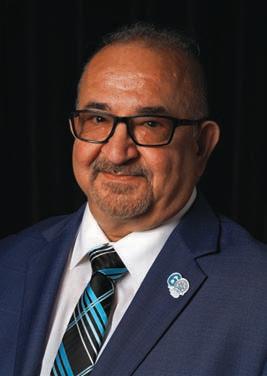

BY Ray Nejadfard
Smart manufacturing is revolutionizing productivity, quality, safety and efficiency across industrial sectors. As robotics and automated technology evolve, the demand for skilled engineers and tech-savvy employees in operations, automation, industrial IT and cybersecurity continues to grow.
To meet that demand, Tri-C developed a four-year degree, the Bachelor of Applied Science in Integrated Digital Manufacturing Engineering Technology (IDMET), better known in industry terms as Smart Manufacturing. It is the College’s first bachelor’s degree.
The program has the hallmarks of Tri-C’s offerings, including the most affordable tuition in the state, flexible learning options and hands-on experience — such as internship opportunities to gain practical skills.
Not only will the IDMET degree emphasize practical experience and teach students the skills needed for immediate employment or career advancement, but it will also bring more value to in-demand industries and strengthen the region’s workforce.
Tri-C listened to its industry partners to develop this multidimensional program that combines the expertise of a dozen specialties, including electrical, mechanical and networking engineering, cybersecurity, cloud security, enterprise security and design. More than 30 certifications are embedded in this degree, providing different career pathways and dynamic skills.
This new degree also helps meet emerging workforce needs in Northeast Ohio. The Ohio Manufacturers’ Association estimates that manufacturing is the largest sector of Ohio’s economy, accounting for 17% of the state’s GDP and 700,000 workers. Cuyahoga County has the state’s highest concentration of manufacturing employment, home to more than 1,600 companies that employ nearly 70,000 workers.
Achieved through the dedication of our faculty and staff, this new program represents a milestone for Tri-C. It demonstrates Tri-C’s innovation in higher education and commitment to workforce development.


